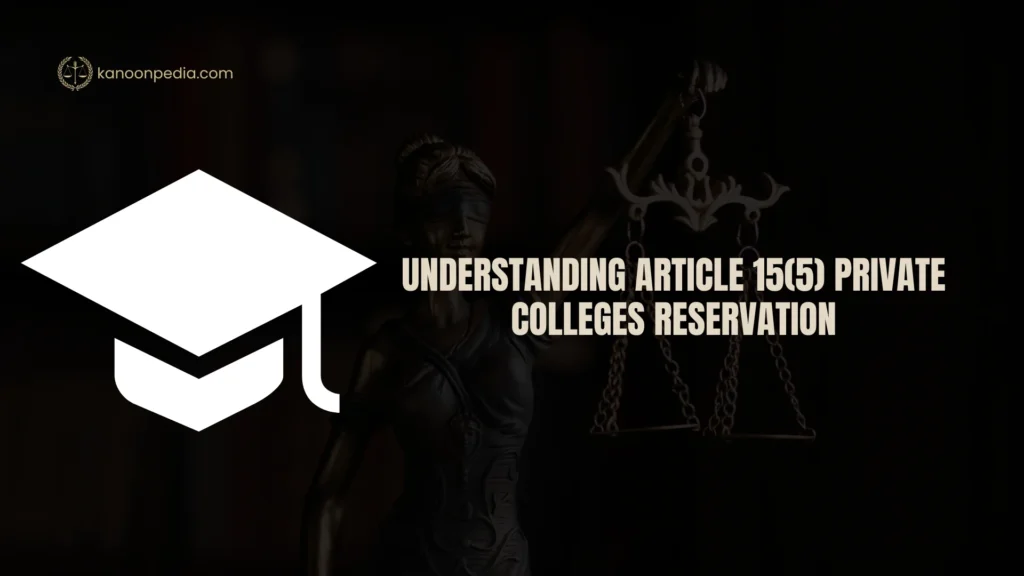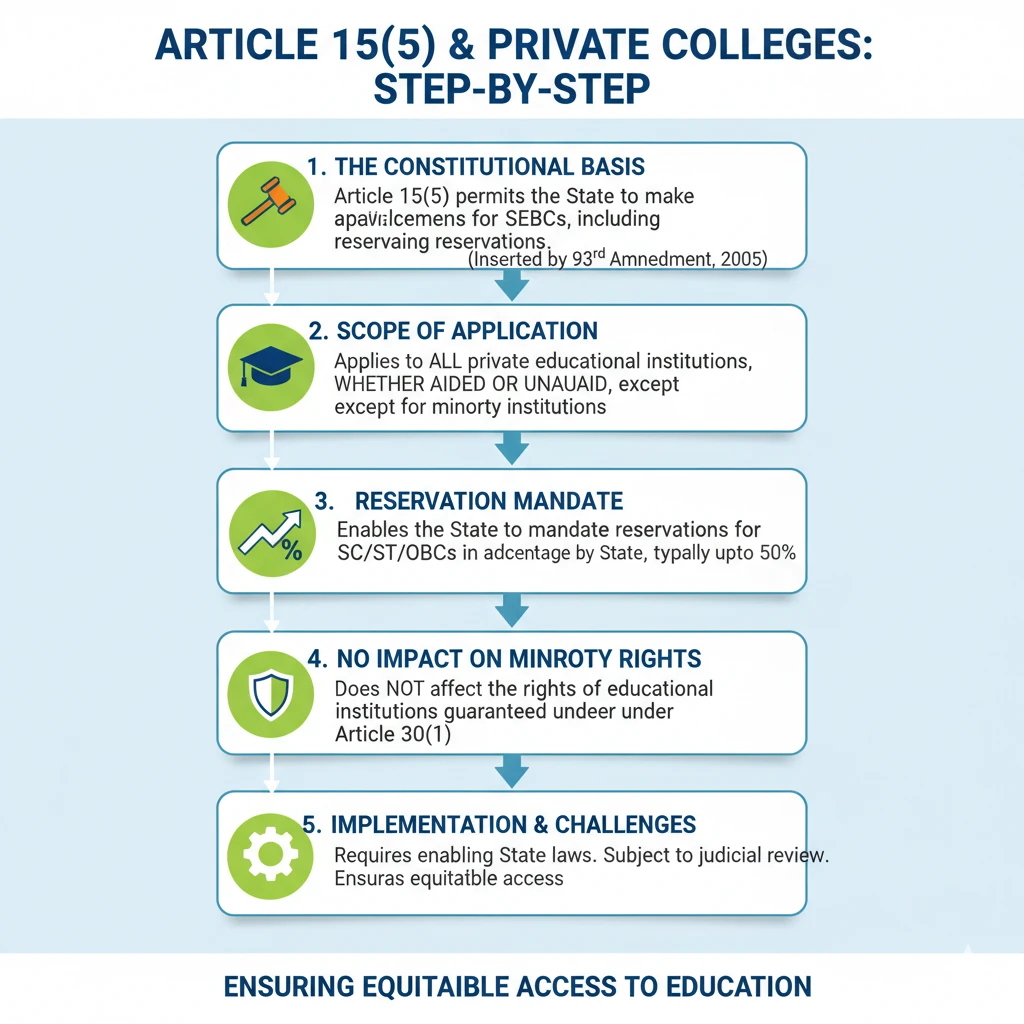Ever wondered why some private colleges in India also provide reservations for SC, ST, and OBC students? Most people think reservations apply only to government institutions, but Article 15(5) of the Indian Constitution changed that. This constitutional amendment expanded the scope of affirmative action and ensured that access to education wasn’t restricted to just public universities.

Understanding Article 15(5) private colleges reservation is not just a matter of legal interpretation; it has a direct impact on thousands of students entering higher education every year. In this blog, we’ll break down the bare provision, trace the historical context, examine landmark judgments, and offer practical insights into how it affects both students and private colleges. Think of it as your one-stop guide to unpacking Article 15(5) — without the legal jargon.
Table of Contents
The Bare Provision of Article 15(5)
Article 15(5) of the Constitution of India states:
“Nothing in this article or in sub-clause (g) of clause (1) of Article 19 shall prevent the State from making any special provision, by law, for the advancement of any socially and educationally backward classes of citizens or for the Scheduled Castes or the Scheduled Tribes in so far as such special provisions relate to their admission to educational institutions including private educational institutions, whether aided or unaided by the State, other than the minority educational institutions referred to in clause (1) of Article 30.”
The Background: Why Article 15(5) Was Introduced
Before 2005, reservations were primarily applicable to government-run institutions under Article 15(4). However, as private educational institutions grew in number and influence, the gap between privileged students and marginalized communities widened.
The 93rd Constitutional Amendment Act, 2005 introduced Article 15(5). Its intention was simple: ensure equitable access to higher education, even in private colleges that were increasingly crucial to India’s educational ecosystem.
Difference Between Article 15(4) and Article 15(5)
| Feature | Article 15(4) | Article 15(5) |
|---|---|---|
| Scope | Applies to state institutions | Applies to private institutions too |
| Amendment Needed? | Introduced by the First Constitutional Amendment (1951) | Added by the 93rd Constitutional Amendment (2005) |
| Coverage | Reservations in government-run institutions | Reservations in both aided and unaided private colleges |
| Exclusion | Minority institutions included | Minority institutions excluded under Article 30(1) |
How Article 15(5) Enables Reservations in Private Colleges
Applicability to Aided vs. Unaided Institutions
- Aided Private Colleges: Fully covered under reservation mandates.
- Unaided Private Colleges: Also included, ensuring they cannot bypass social obligations.
- Exemption: Minority educational institutions are exempt to protect cultural autonomy under Article 30.
Role of Minority Institutions
Minority educational institutions are exempt from Article 15(5), preserving their right to admit students based on religious or linguistic identity.
Landmark Case: Ashoka Kumar Thakur v. Union of India (2008)
- The Supreme Court upheld the validity of Article 15(5).
- It clarified that minority institutions are excluded.
- It also balanced the discussion of equality with social justice by reinforcing reservations as part of the constitutional commitment.
Practical Implications for Students and Colleges
How Students Benefit
- More opportunities in top-ranked private institutions.
- Access to professional courses like engineering, medicine, and law.
- Bridges the gap between privileged and disadvantaged groups.
Challenges for Private Colleges
- Reduced autonomy in admission processes.
- Pressure to balance meritocracy with mandated quotas.
- Legal compliance burdens.
Quick Takeaways:
- For students: More inclusive opportunities.
- For colleges: Balancing autonomy with constitutional commitment.
Myths vs. Reality About Article 15(5)
Myth: Reservations apply only in government institutions.
Reality: Private colleges too, with the exception of minority institutions, must implement reservations.
Myth: Reservations are optional for private colleges.
Reality: They are mandatory under Article 15(5).
Did You Know?
- The 93rd Amendment was inspired by the need to universalize access to higher education with social justice.
- Private unaided institutions now account for more than 60% of India’s higher education seats.
Case Study: OBC Reservations in Private Educational Institutions
Following the 2008 implementation of Article 15(5), OBC students saw a 10% increase in admissions across private universities within just three years (Planning Commission Report, 2011). This demonstrates measurable social impact.
Common Mistakes in Understanding Article 15(5)
- Confusing it with Article 15(4).
- Forgetting minority institutions are exempt.
- Believing colleges can avoid compliance.
Expert Tips for Students Navigating Reservation Policies
- Always verify reservation quotas in college admission brochures.
- Use government-certified caste/SEBC/OBC certificates to avoid last-minute hurdles.
- Explore both public and private options since both fall under Article 15(5).

Internal and External Linking Suggestions
Internal Links:
- Blog on Article 14: Equality Before Law
- Blog on Article 19: Freedom of Speech and Expression
- Guide on Reservation Policies in Indian Education System
External Links:
- Ministry of Education (India) Reports
- Planning Commission Report on OBC Reservation (2011)
- Supreme Court of India judgments database
FAQs (People Also Ask)
- Does Article 15(5) apply to private unaided colleges?
Yes, Article 15(5) applies to both aided and unaided private colleges, mandating reservations for socially and educationally backward classes, SCs, and STs in admissions. - Are minority institutions exempt from Article 15(5)?
Yes, minority educational institutions established on religious or linguistic grounds are exempt from the reservation requirements under Article 15(5) as protected under Article 30(1). - How does Article 15(5) differ from Article 15(4)?
Article 15(4) allows reservations only in government and aided institutions, whereas Article 15(5), introduced by the 93rd Amendment, extends the reservation mandate to private, unaided educational institutions as well, excluding minority institutions. - Can private colleges challenge Article 15(5)?
Private colleges, especially minority institutions, have legally contested the scope of Article 15(5), but the Supreme Court has upheld its validity while confirming exemptions for minority institutions. - What percentage of seats are reserved under Article 15(5)?
The amendment allows state laws to specify reservation percentages, commonly conforming to the 27% OBC, 15% SC, and 7.5% ST quotas used in public institutions, but exact percentages can vary by state legislation.
Checklist for Students Applying Under Reservation Quotas
- Valid caste/SEBC certificate
- Application submitted within deadline
- Verified institution’s admission brochure for quota details
- Considered both government and private options
Key Summary Points Private Colleges Reservation
- Article 15(5) extends reservation policy to private colleges.
- Introduced via 93rd Amendment in 2005.
- Excludes minority institutions.
- Students gain more access; colleges face compliance duties.
Conclusion + Call-to-Action
Article 15(5) private colleges reservation is not just a legal clause—it is a lifeline for millions of students seeking equal opportunity. It reflects India’s long-standing pursuit of balancing merit with social justice in education. If you’re a student, always know your rights and check how private colleges apply this provision. If you’re a college, compliance is not optional—it’s constitutional.
What’s your take on Article 15(5)? Should private colleges play an even bigger role in democratizing access to education? Share your thoughts in the comments, or pass this along to someone preparing for college admissions or UPSC prep.
Author Bio
Adv. Arunendra Singh, a legal scholar, content strategist, and innovator who bridges traditional legal practice with emerging technologies. Currently at NLSIU, Bangalore, has been awarded by President of India for exceptional academic and leadership achievements. As Founder of Kanoonpedia, Arunendra has built a premier legal-education platform offering in-depth constitutional analyses, landmark case studies, and exam-focused guides.
He is also Co-Founder of Clicknify, the “Anti-Agency Agency” for startups. Using his proprietary Legal Clarity™ framework—which fuses doctrinal research, SEO-driven content architecture, and interactive study tools, he has elevated user engagement by over 70% and doubled session durations across both platforms. In his consulting practice, Arunendra applies expertise in digital marketing and UX clarity audits to help edtech ventures achieve measurable growth through data-driven design and strategic conversion roadmaps.
Trusted by top-tier law faculties, student associations, and early-stage startups, his hands-on workshops and advisory services have boosted organic traffic by 150% and transformed passive readers into active learners. Connect with Adv. Arunendra Singh for thought leadership in legal innovation and technology law: LinkedIn